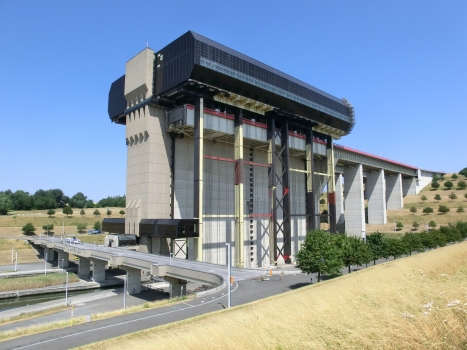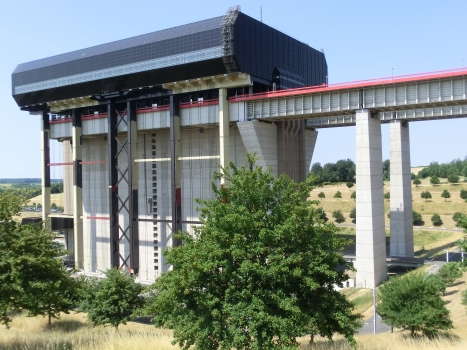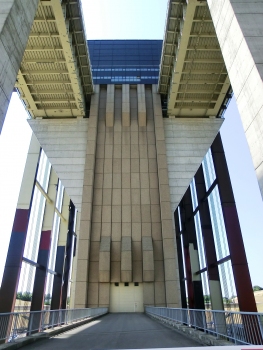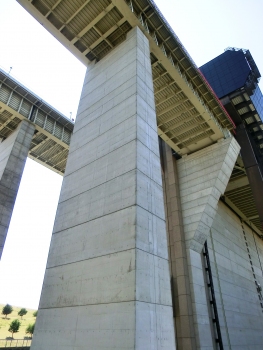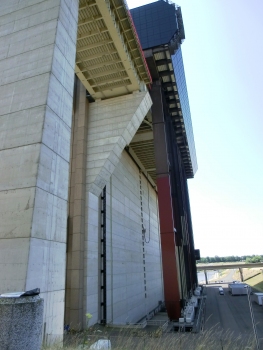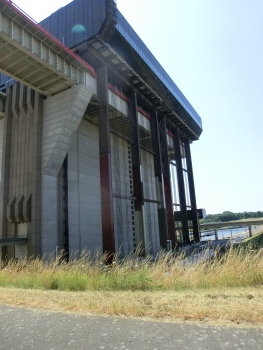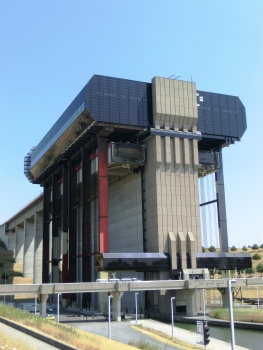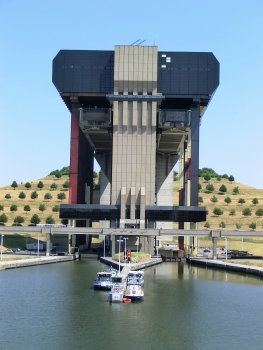General Information
| Name in local language: | Ascenseur à bateaux de Strépy-Thieu |
|---|---|
| Beginning of works: | 1982 |
| Completion: | 2002 |
| Status: | in use |
Project Type
| Function / usage: |
Electro-mechanical lift lock |
|---|---|
| Material: |
Concrete structure Structurae Plus/Pro - Subscribe Now! machine hall: Steel structure |
Location
| Location: |
La Louvière, Hainaut, Wallonia, Belgium Le Roeulx, Hainaut, Wallonia, Belgium |
|---|---|
| For: |
|
| Part of: |
|
| Coordinates: | 50° 28' 42.19" N 4° 6' 35.93" E |
Technical Information
Dimensions
| total length | 135 m | |
| total weight | 220 000 t | |
| total height | 117 m | |
| total width | 81 m | |
| barge | width | 16.5 m |
| height | 8 m | |
| length | 118.6 m | |
| bridge | number of spans | 2 x 4 |
| trough | length | 112 m |
| water depth | 3.35 - 4.15 m |
Quantities
| structural steel | 2 200 t |
Materials
| piers |
reinforced concrete
|
|---|---|
| foundation slab |
reinforced concrete
|
Excerpt from Wikipedia
The Strépy-Thieu boat lift (French:L'ascenseur funiculaire de Strépy-Thieu) lies on a branch of the Canal du Centre in the municipality of Le Rœulx, Hainaut, Belgium. With a height difference of 73.15 metres (240.0 ft) between the upstream and downstream reaches, it was the tallest boat lift in the world upon ist completion, and remained so until the Three Gorges Dam ship lift in China was completed in January 2016.
History
The boat lift was designed during the Canal du Centre's modernisation program in order to replace a system of two locks and four 16-metre (52 ft) lifts dating from 1888 to 1919. The canal itself began operations in 1879 and ist locks and lifts were able to accommodate vessels of up to 300 tonnes. By the 1960s, this was no longer adequate for the new European standard of 1350 tonnes for barge traffic, and a replacement was sought.
Construction of the lift commenced in 1982 and was not completed until 2002 at an estimated cost of €160 million (then 6.4 billion BEF), but once operational, permitted river traffic of up to the new 1350-tonne standard to pass between the waterways of the Meuse and Scheldt rivers. The lift increased river traffic from 256 kT in 2001 to 2,295 kT in 2006.
The four older lifts on the Canal du Centre, which became bypassed by the new Canal du Centre, are on the UNESCO World Heritage list, because of their architectural and historical value.
Design
The structure at Strépy-Thieu consists of two independent counterweighted caissons which travel vertically between the upstream and downstream sections. Due to Archimedes' Principle, the caissons weigh the same whether they are laden with a boat or simply contain water. In practice, variations in the water level mean that the mass of each caisson varies between 7200 and 8400 tonnes. The caissons have useful dimensions of 112 m × 12 m (367 ft × 39 ft) and a water depth of between 3.35 and 4.15 m (11.0 and 13.6 ft). Each caisson is supported by 112 suspension cables (for counterbalance) and 32 control cables (for lifting/lowering), each of 85 mm (3.3 in) diameter. The mass of the counterbalance was calculated to keep the tension in each of the control cables below 100 kN (22,000 lbf) at all times. The suspension cables pass over idler pulleys with a diameter of 4.8 m (16 ft). Four electric motors power eight winches per caisson via speed-reduction gearboxes and the 73.15-metre (240.0 ft) lift is completed in seven minutes. The structure is massively reinforced to provide rigidity against torsional forces during operation and has a mass of approximately 200,000 tonnes. The vertically moving watertight gates are designed to withstand a 5 km/h (3.1 mph) impact from a 2000 tonne vessel.
The boat lift is promoted as a tourist attraction in ist own right by the government of Hainaut. A pedestrian ticket for a one-way ride on the lift costs €5.50.
Text imported from Wikipedia article "Strépy-Thieu boat lift" and modified on July 23, 2019 according to the CC-BY-SA 4.0 International license.
Participants
- Ministère Wallon de l'Équipement et des Transports
- Société Wallonne de Financement des Infrastructures
Relevant Web Sites
Relevant Publications
- L'ascenseur à bâteaux de Strépy-Thieu. brochure, ir Benedictus Faes, Namur (Belgium), 2002.
- (2002): Du mécanique au numérique. La division de l'Electricité, de l'Electromécanique, de l'Informatique et des Télécommunications. Editions M.E.T., Namur (Belgium).
- (2002): Un géant funiculaire sur le canal du Centre. L'ascenseur à bateaux de Strépy-Thieu. technical report, MET, Namur (Belgium).
- (2001): Schiffslift. Die Schiffs-Hebewerke der Welt. Menschen - Technik - Geschichte. Landschaftsverband Westfalen-Lippe, Westfälisches Industriemuseum, Dortmund (Germany), pp. 375.
- About this
data sheet - Structure-ID
20009959 - Published on:
08/08/2003 - Last updated on:
19/07/2018

